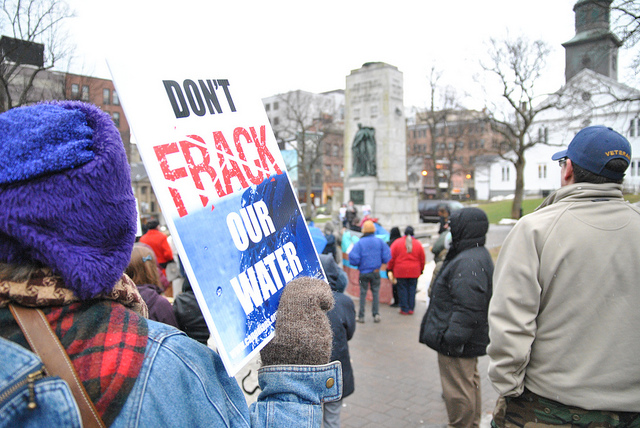Change the conversation, support rabble.ca today.
With anti-fracking protests ongoing in New Brunswick, Premier David Alward has been going around with a strangely blissful look on his face, proclaiming his determination to forge ahead because of the gusher of tax revenues and jobs he claims will surely follow.
New Brunswick, running deficits of over a half billion dollars a year, is especially desperate, which is unfortunately what all this is about. But the issue reverberates in other provinces, including Nova Scotia.
The protests are over the environment but, alas, there’s a deeper source of trouble afoot for the fracking industry: it’s from the heart of the financial world where billions of dollars are being lost and the sense of having been suckered by hype is setting in.
Some saw it coming. The conservative business magazine Forbes argued a while back that the profitability of fracking was a fantasy and that “we can expect some staggering investment errors” because what it’s all about is “some very stupid money chasing an illusion that will surely end in tears.”
The tears are now flowing. The head of Shell Oil said recently that investing $24 billion in fracking was one of his biggest regrets, as he writes down huge losses. Other operators are doing the same — names like H.P. Billiton, Chesapeake, Encana. Some CEOs have lost their jobs over it. Apparently the ones who made money are those who sold out to “stupid money” before the jig was up.
Hydraulic fracturing, like extracting tar sands oil, is very expensive. It is also very short-lived. A fracked well is not like a regular natural gas (or oil) deposit. Production declines by as much as 50 per cent or more in the first year, as much as 80 per cent by the second, after which it’s a dribble. To keep gas coming you have to keep fracking. And with the gold-rush mentality surrounding it, and cheap financing, the industry — even at a loss — has flooded North America and driven prices below the cost of production.
The next step was supposed to be LNG terminals to ship gas to Asia, where gas prices are four or five times higher than here. Alas, again, sober voices are saying there may not be enough to export. The gas that was supposed to keep the U.S. awash in the stuff for 100 years is now, according to some accounts, due to peak within the decade.
The Marcellus shale formation in Pennsylvania, first hyped as containing as much a 500 trillion cubic feet of recoverable gas, has now been reduced by the U.S. Geological Survey to perhaps as little as 80 tcf. And the California government, like David Alward’s, had itself briefly in ecstasy at the prospect, according to early estimates, of $25 billion in tax revenue and three million jobs by 2020 from its Monterey formation. The geologists took a second look and the story now is: with present technology, forget it.
As for the environment, just two points. The effects will only be known slowly because most U.S. fracking happens on private lands, where owners have to sign confidentiality agreements. In other words, no wimping and whining about polluted rivers and dead cattle. And, according to reports, lobbying money from the fracking industry is pouring into the U.S. Congress in unprecedented amounts to snuff a measure that would force frackers to disclose what chemicals they use in their operations.
But here are two bigger points. Irrational energy illusions are nothing new as we seek the magic potion that will relieve us of our dreary duty to seriously change our ways — use less, use it more efficiently, and seek the alternatives.
Nuclear was supposed to be, by now, “too cheap to meter,” according to the head of the U.S. Atomic Energy Commission in the mid-1950s. Ethanol mixed with gasoline, another of many hyped saviours that flashed by, is now suspected to be damaging engines, and lawsuits are at the ready in the U.S.
Meanwhile, here in Nova Scotia, fracking is one of those notions that creeps into the economic development debate. More and more commentators raise opposition to fracking — which is under moratorium here — as more evidence of our entrepreneurial backwardness and our government’s lack of Alberta (and New Brunswick)-style “political courage.”
Further, a U.S. report by a Montana institute called Headwaters Economics, which has studied western U.S. counties that had oil and gas plays from 1980 to 2011, just fell into my lap.
It found that the effect of this mostly temporary activity left these counties with higher crime rates and lower educational achievement than their neighbours, and with declining per capita incomes.
As we struggle with our own economic future, here’s hoping that the Ivany Commission, which is studying the rural economy in Nova Scotia, keeps all this in perspective.
Like this article? Chip in to keep stories like these coming!
Ralph Surette is a freelance journalist in Yarmouth County. This article was first published in the Chronicle Herald.
Photo: Paul B. (Halifax)/flickr



